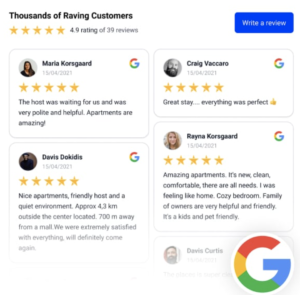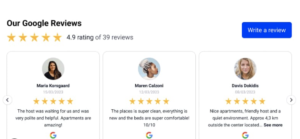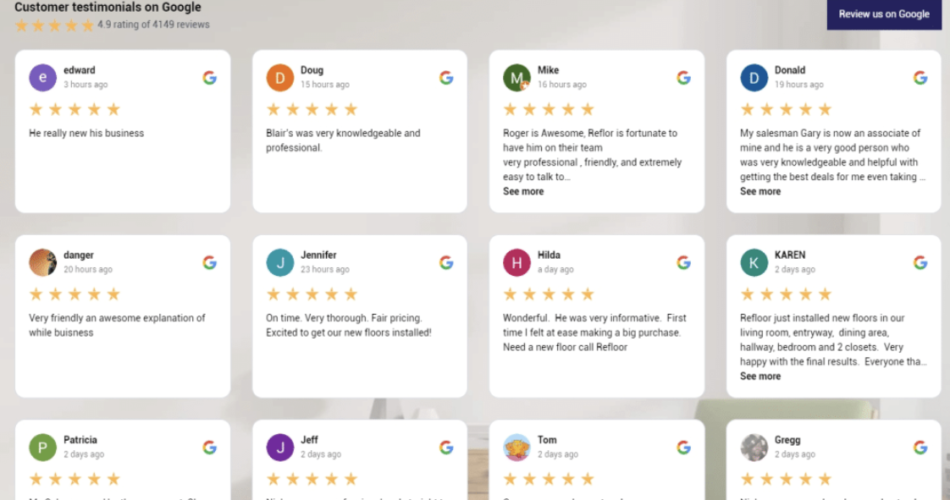In today’s digital age, the power of online reviews cannot be overstated. Among the multitude of review platforms, Google reviews stand out as a crucial factor in shaping a business’s online reputation and, ultimately, its success. As a seasoned writer, I’ve witnessed firsthand the profound impact that Google reviews can have on a company’s fortunes.
Google is the undisputed leader in search engine dominance, and its review system has become an integral part of the customer experience. When potential customers search for a business, the Google reviews often appear prominently, providing valuable insights into the quality of products or services, customer satisfaction, and overall brand perception.

Google Reviews
Contents
- 1 Why Are Google Reviews Important?
- 2 How Do Google Reviews Impact Your Online Reputation?
- 3 The Role of Google Reviews in Business Success
- 4 How to Create a Google Review Strategy
- 5 Tips for Getting More Google Reviews
- 6 How to Respond to Google Reviews
- 7 The Impact of Negative Google Reviews and How to Handle Them
- 8 Case Studies of Businesses That Have Benefited from Positive Google Reviews
- 9 Tools and Resources for Managing and Monitoring Google Reviews
Why Are Google Reviews Important?
Google reviews hold immense sway over consumer decision-making. Studies have shown that a significant majority of consumers rely on online reviews to guide their purchasing decisions. In fact, a staggering 93% of consumers say that online reviews have influenced their buying choices. This underscores the critical role that Google reviews play in shaping a business’s reputation and, consequently, its bottom line.
Moreover, Google’s algorithm places a high value on reviews, using them as a key factor in determining a business’s search engine rankings. The more positive reviews a company has, the more likely it is to appear at the top of search results, making it easier for potential customers to find and engage with the business.
How Do Google Reviews Impact Your Online Reputation?
A business’s online reputation is a reflection of its brand, and Google reviews are a significant component of this digital footprint. Positive reviews can enhance a company’s credibility, build trust with potential customers, and reinforce the perception of quality and reliability. Conversely, negative reviews can tarnish a business’s reputation, deter potential customers, and even impact its search engine rankings.
The impact of Google reviews on a company’s online reputation extends far beyond the initial search results. Potential customers often dig deeper, reading through multiple reviews to gain a comprehensive understanding of a business’s strengths, weaknesses, and overall customer experience. A consistent stream of positive reviews can solidify a company’s reputation as a trusted and reliable provider, while a pattern of negative reviews can raise red flags and turn away potential customers.

Google Reviews
The Role of Google Reviews in Business Success
The influence of Google reviews extends beyond just online reputation; it directly impacts a business’s success. Positive reviews can lead to increased customer acquisition, higher conversion rates, and ultimately, greater revenue. Consumers are more likely to choose a business with a strong Google review profile, as it signals quality, reliability, and a positive customer experience.
Moreover, Google reviews can serve as a valuable feedback mechanism, providing businesses with insights into customer pain points, areas for improvement, and opportunities for innovation. By actively monitoring and responding to reviews, companies can demonstrate their commitment to customer satisfaction and continuously enhance their offerings.
How to Create a Google Review Strategy
Developing a comprehensive Google review strategy is essential for businesses that aim to harness the power of online reviews. This strategy should encompass various elements, including:
- Claiming and Verifying Your Google Business Profile: Ensure that your business is properly listed on Google and that the information is accurate and up-to-date.
- Encouraging Customer Reviews: Implement a system to proactively request reviews from satisfied customers, such as through email campaigns, in-store prompts, or post-purchase follow-ups.
- Responding to Reviews: Engage with both positive and negative reviews in a timely and professional manner, demonstrating your commitment to customer satisfaction.
- Monitoring and Analyzing Review Data: Regularly track and analyze your Google review metrics, including the volume, sentiment, and trends, to identify areas for improvement and capitalize on your strengths.
- Incorporating Review Insights into Business Decisions: Use the feedback gathered from Google reviews to inform product or service enhancements, customer service improvements, and overall business strategy.
Tips for Getting More Google Reviews
Increasing the volume and quality of your Google reviews requires a proactive and strategic approach. Here are some effective tips to help you get more Google reviews:
- Provide Exceptional Customer Service: Consistently deliver a positive customer experience that exceeds expectations, as satisfied customers are more likely to leave a review.
- Make it Easy for Customers to Leave Reviews: Provide clear instructions and direct links to your Google Business Profile, making the review process seamless for your customers.
- Incentivize Review Requests: Consider offering small incentives, such as discounts or loyalty program rewards, to encourage customers to leave reviews, while ensuring compliance with Google’s guidelines.
- Leverage Email and Social Media: Reach out to your existing customer base through email campaigns and social media platforms, asking them to share their experiences on your Google Business Profile.
- Monitor Review Trends and Respond Promptly: Regularly track your Google review metrics and respond to both positive and negative reviews in a timely and professional manner.
How to Respond to Google Reviews
Responding to Google reviews, both positive and negative, is a crucial aspect of your online reputation management strategy. Here are some best practices for effectively responding to reviews:
- Respond Promptly: Aim to respond to reviews within 24-48 hours to demonstrate your commitment to customer satisfaction.
- Personalize Your Responses: Tailor your responses to each individual review, addressing the customer’s specific concerns or feedback.
- Maintain a Professional Tone: Avoid defensive or emotional language, and instead, adopt a polite, empathetic, and solution-oriented approach.
- Acknowledge Positive Reviews: Express genuine gratitude for positive reviews, highlighting the aspects of your business that the customer appreciated.
- Address Negative Reviews Constructively: Acknowledge the customer’s concerns, apologize if appropriate, and offer a resolution or next steps to address the issue.
The Impact of Negative Google Reviews and How to Handle Them
While positive Google reviews can significantly boost a business’s online reputation and success, negative reviews can also have a substantial impact. Poorly handled negative reviews can lead to a damaged reputation, lost customers, and even a decline in search engine rankings.
However, it’s important to remember that negative reviews can also present opportunities for growth and improvement. By addressing these reviews proactively and constructively, businesses can turn a negative situation into a positive one.
Here are some strategies for effectively handling negative Google reviews:
- Respond Promptly and Professionally: Acknowledge the customer’s concerns, apologize if appropriate, and offer a solution or next steps to address the issue.
- Investigate the Complaint: Gather all the relevant information about the customer’s experience and determine the root cause of the problem.
- Offer a Resolution: Provide a genuine and reasonable solution, such as a refund, exchange, or additional service, to address the customer’s concerns.
- Learn from the Feedback: Analyze the negative review to identify areas for improvement in your products, services, or customer experience.
- Monitor and Address Ongoing Issues: Continuously monitor your Google reviews and address any recurring negative feedback to prevent a pattern of poor customer experiences.
Case Studies of Businesses That Have Benefited from Positive Google Reviews
The power of positive Google reviews is best illustrated through real-world examples of businesses that have leveraged this powerful tool to drive their success.
Case Study 1: The Local Bakery The Local Bakery, a family-owned business, had struggled to gain traction in its competitive market. However, after implementing a comprehensive Google review strategy, the bakery saw a significant increase in positive reviews. This, in turn, led to a surge in customer traffic, higher conversion rates, and a substantial boost in revenue. The bakery’s owner attributed much of their success to the trust and credibility built through their positive Google review profile.
Case Study 2: The Tech Startup A tech startup specializing in cloud-based software solutions faced fierce competition in a crowded market. By actively encouraging customer reviews and responding promptly to both positive and negative feedback, the startup was able to establish a strong online reputation. This, coupled with their focus on product quality and customer service, resulted in a steady stream of positive Google reviews. The startup’s growth trajectory skyrocketed, as potential customers were drawn to the company’s proven track record of customer satisfaction.
Case Study 3: The Boutique Hotel A boutique hotel in a popular vacation destination struggled to differentiate itself from larger chain hotels. However, the hotel’s management team recognized the power of Google reviews and implemented a strategy to solicit and respond to customer feedback. By consistently delivering exceptional service and addressing any customer concerns, the hotel was able to amass a substantial number of positive reviews. This, in turn, attracted a loyal customer base and helped the hotel stand out in a crowded market, leading to increased bookings and revenue.
Tools and Resources for Managing and Monitoring Google Reviews
Effectively managing and monitoring your Google reviews requires the use of various tools and resources. Here are some of the most valuable options to consider:
- Google My Business: This free tool allows you to claim, verify, and manage your business’s presence on Google, including the ability to respond to reviews.
- Review Monitoring Tools: Services like Reputation.com, Birdeye, and Podium offer comprehensive review management platforms, allowing you to track, analyze, and respond to reviews across multiple platforms, including Google.
- Review Generation Tools: Tools like NiceJob, Podium, and BirdEye can help you automate the process of requesting and collecting reviews from your customers.
- Review Analysis Tools: Platforms like Sentiment Analyzer and ReviewTrackers provide advanced analytics and insights into the sentiment and trends of your Google reviews.
- Google Alerts: Set up Google Alerts for your business name and key products or services to receive real-time notifications of new reviews and mentions.

Google My Business
By leveraging these tools and resources, you can effectively monitor, manage, and respond to your Google reviews, ultimately enhancing your online reputation and driving business success.
To learn more about how you can leverage the power of Google reviews to boost your online reputation and business success, schedule a consultation with our team of digital marketing experts today. We’ll work with you to develop a customized Google review strategy that aligns with your unique business goals and needs.
